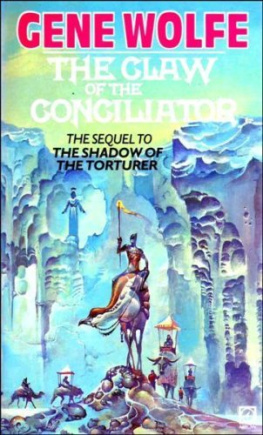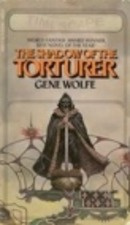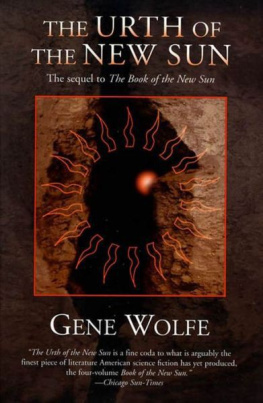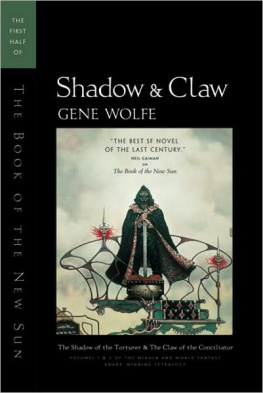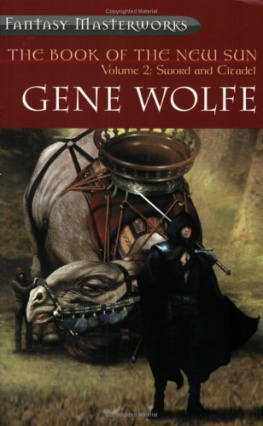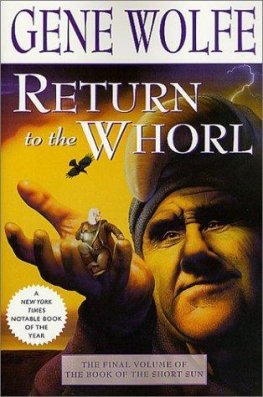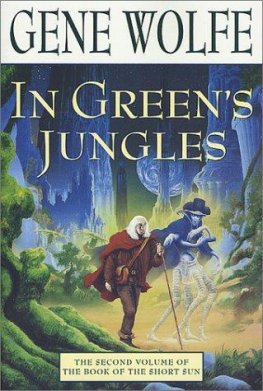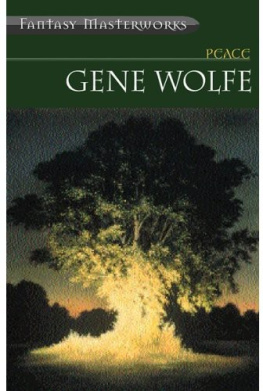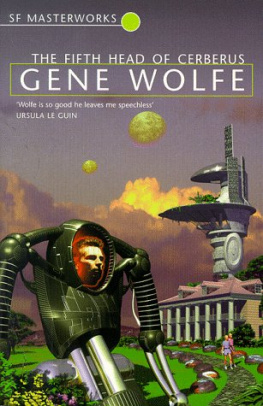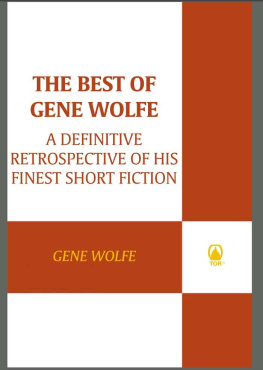Gene Wolfe - Book of the New Sun (Fantasy Masterworks 02) (Vol 1)
Here you can read online Gene Wolfe - Book of the New Sun (Fantasy Masterworks 02) (Vol 1) full text of the book (entire story) in english for free. Download pdf and epub, get meaning, cover and reviews about this ebook. year: 2000, publisher: Millennium Paperbacks, genre: Detective and thriller. Description of the work, (preface) as well as reviews are available. Best literature library LitArk.com created for fans of good reading and offers a wide selection of genres:
Romance novel
Science fiction
Adventure
Detective
Science
History
Home and family
Prose
Art
Politics
Computer
Non-fiction
Religion
Business
Children
Humor
Choose a favorite category and find really read worthwhile books. Enjoy immersion in the world of imagination, feel the emotions of the characters or learn something new for yourself, make an fascinating discovery.
- Book:Book of the New Sun (Fantasy Masterworks 02) (Vol 1)
- Author:
- Publisher:Millennium Paperbacks
- Genre:
- Year:2000
- Rating:3 / 5
- Favourites:Add to favourites
- Your mark:
- 60
- 1
- 2
- 3
- 4
- 5
Book of the New Sun (Fantasy Masterworks 02) (Vol 1): summary, description and annotation
We offer to read an annotation, description, summary or preface (depends on what the author of the book "Book of the New Sun (Fantasy Masterworks 02) (Vol 1)" wrote himself). If you haven't found the necessary information about the book — write in the comments, we will try to find it.
Book of the New Sun (Fantasy Masterworks 02) (Vol 1) — read online for free the complete book (whole text) full work
Below is the text of the book, divided by pages. System saving the place of the last page read, allows you to conveniently read the book "Book of the New Sun (Fantasy Masterworks 02) (Vol 1)" online for free, without having to search again every time where you left off. Put a bookmark, and you can go to the page where you finished reading at any time.
Font size:
Interval:
Bookmark:
In rendering this book - originally composed in a tongue that has not yet achieved existence - into English, I might easily have saved myself a great deal of labor by having recourse to invented terms; in no case have I done so. Thus in many instances I have been forced to replace yet undiscovered concepts by their closest twentieth-century equivalents. Such words as peltast, androgyn, and exultant are substitutions of this kind, and are intended to be suggestive rather than definitive. Metal is usually, but not always, employed to designate a substance of the sort the word suggests to contemporary minds. When the manuscript makes reference to animal species resulting from biogenetic manipulation or the importation of extrasolar breeding stock, the name of a similar extinct species has been freely substituted. (Indeed, Severian sometimes seems to assume that an extinct species has been restored.) The nature of the riding and draft animals employed is frequently unclear in the original text. I have scrupled to call these creatures horses, since I am certain the word is not strictly correct. The "destriers" of The Book of the New Sun are unquestionably much swifter and more enduring animals than those we know, and the speed of those used for military purposes seems to permit the delivering of cavalry charges against enemies supported by high-energy armament. Latin is once or twice employed to indicate that inscriptions and the like are in a language Severian appears to consider obsolete. What the actual language may have been, I cannot say.
To those who have preceded me in the study of the posthistoric world, and particularly to those collectors-too numerous to name here - who have permitted me to examine artifacts surviving so many centuries of futurity, and most especially to those who have allowed me to visit and photograph the era's few extant buildings, I am truly grateful.
It is possible I already had some presentiment of my future. The locked and rusted gate that stood before us, with wisps of river fog threading its spikes like the mountain paths, remains in my mind now as the symbol of my exile. That is why I have begun this account of it with the aftermath of our swim, in which I, the torturer's apprentice Severian, had so nearly drowned.
"The guard has gone." Thus my friend Roche spoke to Drotte, who had already seen it for himself.
Doubtfully, the boy Eata suggested that we go around. A lift of his thin, freckled arm indicated the thousands of paces of wall stretching across the slum and sweeping up the hill until at last they met the high curtain wall of the Citadel. It was a walk I would take, much later.
"And try to get through the barbican without a safe-conduct? They'd send to Master Gurloes."
"But why would the guard leave?"
"It doesn't matter." Drotte rattled the gate. "Eata, see if you can slip between the bars."
Drotte was our captain, and Eata put an arm and a leg through the iron palings, but it was immediately clear that there was no hope of his getting his body to follow.
"Someone's coming," Roche whispered. Drotte jerked Eata out. I looked down the street. Lanterns swung there among the fog-muffled sounds of feet and voices. I would have hidden, but Roche held me, saying, "Wait, I see pikes."
"Do you think it's the guard returning?"
He shook his head. "Too many."
"A dozen men at least," Drotte said.
Still wet from Gyoll we waited. In the recesses of my mind we stand shivering there even now. Just as all that appears imperishable tends toward its own destruction, those moments that at the time seem the most fleeting recreate themselves - not only in my memory (which in the final accounting loses nothing) but in the throbbing of my heart and the prickling of my hair, making themselves new just as our Commonwealth reconstitutes itself each morning in the shrill tones of its own clarions.
The men had no armor, as I could soon see by the sickly yellow light of the lanterns; but they had pikes, as Drotte had said, and staves and hatchets. Their leader wore a long, double-edged knife in his belt. What interested me more was the massive key threaded on a cord around his neck; it looked as if it might fit the lock of the gate.
Little Eata fidgeted with nervousness, and the leader saw us and lifted his lantern over his head. "We're waiting to get in, good-man," Drotte called. He was the taller, but he made his dark face humble and respectful.
"Not until dawn," the leader said gruffly. "You young fellows had better get home."
"Goodman, the guard was supposed to let us in, but he's not here,"
"You won't be getting in tonight." The leader put his hand on the hilt of his knife before taking a step closer. For a moment I was afraid he knew who we were.
Drotte moved away, and the rest of us stayed behind him. "Who are you, goodman?
You're not soldiers."
"We're the volunteers," one of the others said. "We come to protect our own dead."
"Then you can let us in."
The leader had turned away. "We let no one inside but ourselves." His key squealed in the lock, and the gate creaked back.
Before anyone could stop him Eata darted through. Someone cursed, and the leader and two others sprinted after Eata, but he was too fleet for them. We saw his tow-colored hair and patched shirt zigzag among the sunken graves of paupers, then disappear in the thicket of statuary higher up. Drotte tried to pursue him, but two men grabbed his arms.
"We have to find him. We won't rob you of your dead."
"Why do you want to go in, then?" one volunteer asked.
"To gather herbs," Drotte told him. "We are physicians' gallipots. Don't you want the sick healed?"
The volunteer stared at him. The man with the key had dropped his lantern when he ran after Eata, and there were only two left. In their dim light the volunteer looked stupid and innccent; I suppose he was a laborer of some kind. Drotte continued, "You must know that for certain simples to attain their highest virtues they must be pulled from grave soil by moonlight. It will frost soon and kill everything, but our masters require supplies for the winter. The three of them arranged for us to enter tonight, and I borrowed that lad from his father to help me."
"You don't have anything to put simples in."
I still admire Drotte for what he did next. He said, "We are to bind them in sheaves to dry," and without the least hesitation drew a length of common string from his pocket.
"I see," the volunteer said. It was plain he did not. Roche and I edged nearer the gate.
Drotte actually stepped back from it. "If you won't let us gather the herbs, we'd better go. I don't think we could ever find that boy in there now."
"No you don't. We have to get him out."
"All right," Drotte said reluctantly, and we stepped through, the volunteers following. Certain mystes aver that the real world has been constructed by the human mind, since our ways are governed by the artificial categories into which we place essentially undifferentiated things, things weaker than our words for them. I understood the principle intuitively that night as I heard the last volunteer swing the gate closed behind us.
A man who had not spoken before said, "I'm going to watch over my mother. We've wasted too much time already. They could have her a league off by now." Several of the others muttered agreement, and the group began to scatter, one lantern moving to the left and the other to the right. We went up the center path (the one we always took in returning to the fallen section of the Citadel wall) with the remaining volunteers.
It is my nature, my joy and my curse, to forget nothing. Every rattling chain and whistling wind, every sight, smell, and taste, remains changeless in my mind, and though I know it is not so with everyone, I cannot imagine what it can mean to be otherwise, as if one had slept when in fact an experience is merely remote. Those few steps we took upon the whited path rise before me now: It was cold and growing colder; we had no light, and fog had begun to roll in from Gyoll in earnest. A few birds had come to roost in the pines and cypresses, and flapped uneasily from tree to tree. I remember the feel of my own hands as I rubbed my arms, and the lantern bobbing among the steles some distance off, and how the fog brought out the smell of the river water in my shirt, and the pungency of the new-turned earth. I had almost died that day, choking in the netted roots; the night was to mark the beginning of my manhood. There was a shot, a thing I had never seen before, the bolt of violet energy splitting the darkness like a wedge, so that it closed with a thunderclap. Somewhere a monument fell with a crash. Silence then... in which everything around me seemed to dissolve. We began to run. Men were shouting, far off. I heard the ring of steel on stone, as if someone had struck one of the grave markers with a badelaire. I dashed along a path that was (or at least then seemed) completely unfamiliar, a ribbon of broken bone just wide enough for two to walk abreast that wound down into a little dale. In the fog I could see nothing but the dark bulk of the memorials to either side. Then, as suddenly as if it had been snatched away, the path was no longer beneath my feet - I suppose I must have failed to notice some turning. I swerved to dodge an oblesque that appeared to shoot up before me, and collided full tilt with a man in a black coat.
Font size:
Interval:
Bookmark:
Similar books «Book of the New Sun (Fantasy Masterworks 02) (Vol 1)»
Look at similar books to Book of the New Sun (Fantasy Masterworks 02) (Vol 1). We have selected literature similar in name and meaning in the hope of providing readers with more options to find new, interesting, not yet read works.
Discussion, reviews of the book Book of the New Sun (Fantasy Masterworks 02) (Vol 1) and just readers' own opinions. Leave your comments, write what you think about the work, its meaning or the main characters. Specify what exactly you liked and what you didn't like, and why you think so.

